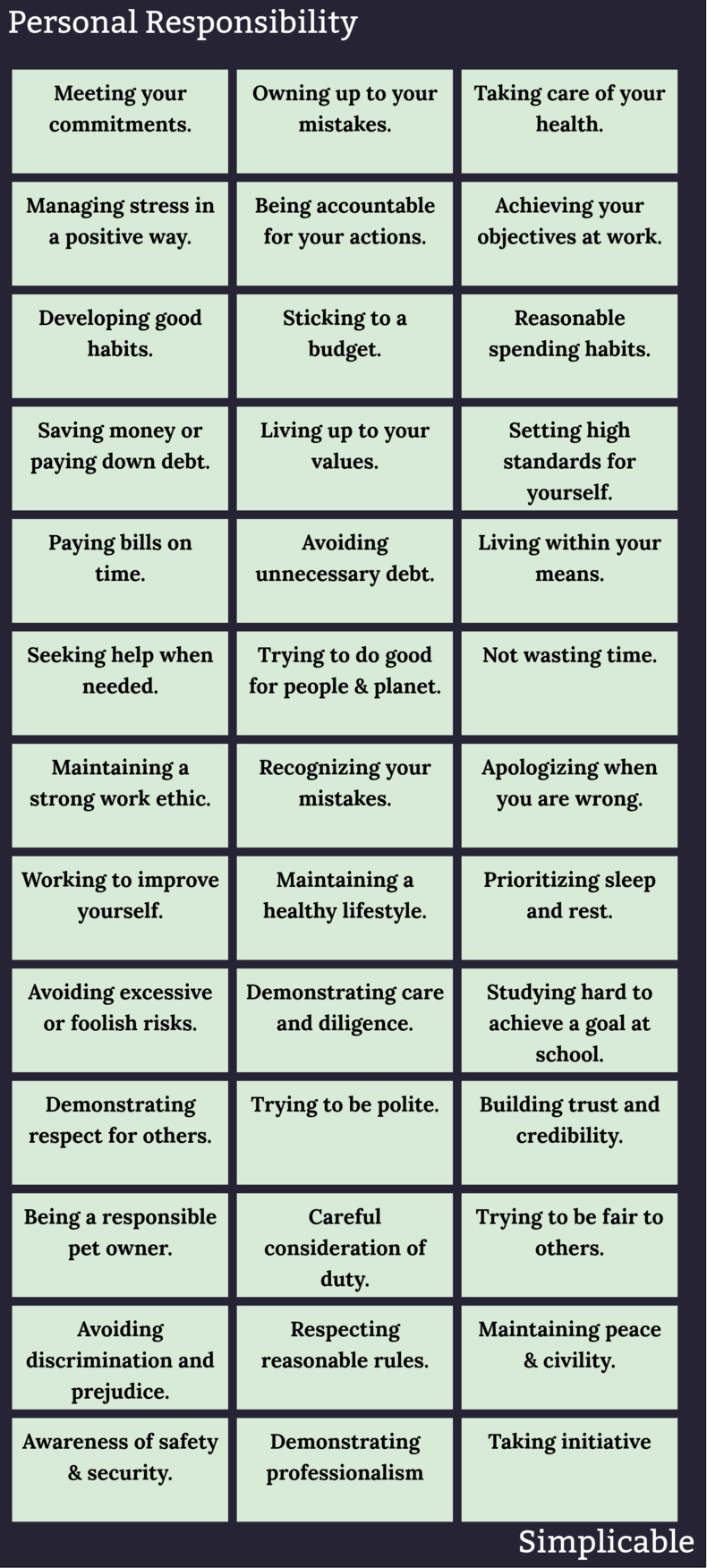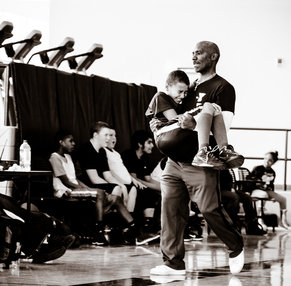
Meeting your commitments. | Owning up to your mistakes. |
Taking care of your health. | Managing stress in a positive way. |
Being accountable for your actions and inactions. | Achieving your objectives at work. |
Developing good habits. | Sticking to a budget. |
Reasonable spending habits. | Saving money or paying down debt. |
Living up to your values. | Setting high standards for yourself. |
Paying bills on time. | Avoiding unnecessary debt. |
Living within your means. | Seeking help when needed. |
Trying to do good for people & planet. | Not wasting time. |
Maintaining a strong work ethic. | Trying to recognize your mistakes to correct. |
Apologizing when you are wrong. | Working to improve yourself. |
Maintaining a healthy lifestyle. | Prioritizing sleep and rest. |
Avoiding excessive or foolish risks. | Demonstrating care and diligence in your work. |
Studying hard to achieve a goal at school. | Demonstrating respect for others. |
Trying to be polite. | Building trust and credibility with the people you know. |
Being a responsible pet owner. | Careful consideration before taking on a duty or task. |
Trying to be fair to others. | Avoiding discrimination and prejudice. |
Respecting reasonable rules. | Respecting valuable traditions and culture. |
Trying to maintain peace and civility. | Being aware of safety and security. |
Demonstrating professionalism in your work. | Taking initiative in your life. |
Agency
Agency is an individual's capacity to control their own life. A person, such as a very small child, who has no agency also has no personal responsibility. Most adults have enough agency to be completely responsible for their own life. There are things that can limit agency such as living in an extremely repressive society or having a serious medical condition or disability.Locus of Control
Locus of control is the degree to which an individual believes they have agency, or the power to control their own life. Those with a weak sense of control view obstacles and problems as defining their life as opposed to opportunities to build strength, knowledge and resilience.Self-Control
The basic responsibility to control your emotions, desires and impulses. For example, the responsibility to control feelings of anger such that you don't act out in an unreasonable way.Honesty
The responsibility to be honest to yourself and to others. This can be expected of a small child, particularly with regards to honesty to others.Accountability
Accepting accountability when you have done something wrong.Moral Duty
The responsibility not to do things that are morally wrong, even if this means challenging authority. For example, following orders doesn't absolve one of personal responsibility for morally reprehensible acts.Civility
The duty to try to resolve differences with others in the most peaceful and respectful way possible. For example, following the rules of a society in trying to change that society.Reasonable Expectations
Conforming to the reasonable expectations of others where this makes sense. This implies adhering to cultural norms unless there is some good reason not to adhere. For example, removing your shoes when you enter someone's home if that is the local custom.Diligence
The responsibility to apply attention and care in your actions. For example, the duty to pay attention to the road when driving a bicycle.Risk Management
Taking reasonable steps to manage risk. For example, performing basic safety related maintenance on a vehicle.Introspection
The duty to try to understand your own thoughts, emotions, motivations, character, values and goals.Extrospection
The responsibility to observe your environment and others and to be mindful of your impact on the world.Motivation
The duty to find energy and enthusiasm for things. For example, an adult can't expect others to be constantly motivating them but rather need to find their own source of drive.Knowledge
The responsibility to develop a reasonable level of knowledge with regards to your family, community, society, culture, planet and profession. For example, the responsibility to know a little about local manners when traveling.Roles
The responsibility to do your very best to fulfill your roles in life whether they be social or economic. For example, trying to do your job well and being a good parent.Self-Direction
Solving problems and making decisions without anyone having to push you. For example, a high school student who is expected to achieve reasonable academic results without parents pushing them to complete things or study.Resilience
The duty to build resilience to stress. For example, an adult can be reasonably expected to handle criticism without losing it.Change
The responsibility to seek improvement and to change in response to your experiences.Health & Wellness
Taking good care of your body and mind.Self-Fulfillment
The duty to try to do something meaningful with your life as you see it.Summary

| Overview: Personal Responsibility | ||
Type | ||
Definition | The duty to try hard to make your life worthwhile and be fair to others. | |
Related Concepts | ||







































